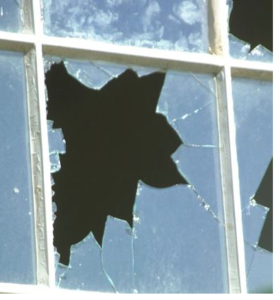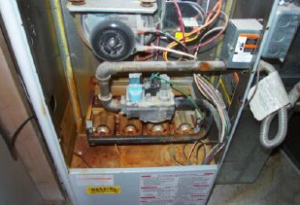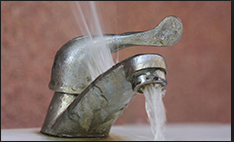Things Will Break In Your Rental Home
If you are a landlord or are considering becoming a landlord, things will break in your rental home. You need to be prepared to pay to fix stuff.
Sometimes you are just fixing something that broke which is easy enough. And sometimes you are stuck cleaning up after a tenant who has moved out.
If you are lucky, it is something that you can charge the tenant for, which makes it easier to swallow. A stopped up toilet would be one example of something that can be charged to a tenant. But, there will be other items, like a water heater, that break in the home that you have to pay to fix.

The Cheap And Easy Fixes
Sometimes the things that break are what I consider to be normal routine maintenance items. They tend to be cheap and easy to fix. A light fixture, a ceiling fan, a broken window, while irritating, won’t cost thousands of dollars to fix or replace. Sometimes, stuff just breaks. You fix it and move on. Sometimes you even charge the tenant for the cost of the repair.

Some Repairs Will Be Expensive and Unexpected
However, the major systems like the furnace, air conditioner, water heater, kitchen appliances, etc. are the landlord’s responsibility. These big ticket items can be a major hit to your wallet. Some houses may have a sump pump that can go out which can lead to flooding. A bad storm may cause a tree to fall on the roof and cause a lot of damage to the house. It is possible that your rental home may develop flooding issues and you will need to install an underwater drain system in the crawl spaces.
Sometimes the things will break are what I consider to be normal routine maintenance items. Click To TweetCosts Of Getting A Home Rent Ready
There is also the cost of getting the home ready for a new tenant. You can easily spend hundreds or even thousands of dollars repairing drywall, replacing doors (they go missing a lot for some reason), ripping out and replacing flooring, paint, etc. on a home that isn’t even in bad shape.
You can spend much more if the tenant:
- Basically destroyed the house
- Stole things like the kitchen and bathroom cabinets
- Leaves two or three dumpster loads of stuff
Document everything in the home. When you turn the tenant over to collections, you will have a solid case to present to the judge.
Collect A Security Deposit
It is very important to collect a damage fee or a security deposit from your tenants when they rent your home. It is equally important for you to put this money in a separate account. Then hold onto it for when they move out! It needs to be a large enough deposit to cover the basic stuff. But, it is usually not enough to cover any large scale damage.
If you are lucky, the house will just need cosmetic items addressed. Hopefully the deposit money will cover all or most of what is needed. But, some of the money will end up coming straight out of your own pocket. It never fails that those surprise repairs always seem to come at the most unexpected (and worst) times possible.

Your Lease Should Spell Out The Costs
Your lease must also make it clear that the tenant is responsible for paying for the costs of some things that break. A stopped up toilet is almost always the fault of the tenant!
Your tenant should also understand that when he moves out, he is responsible for the costs of repairs if they exceed the amount of the damage fee collected.
It is very important to collect a damage fee or a security deposit from your tenants when they rent your home. Click To Tweet
Always do a move out inspection. It is important to have the tenant attend the move out inspection so that you can discuss the repairs that pop up with the tenant. When the tenant is present, he can explain what happened. You can document it in front of the tenant and explain that he will be charged.
Emergency Fund
I would recommend that you have an emergency fund that you add to every month to help out with unexpected expenses as most of us don’t have large sums of money to pull out and pay for repairs. If you are starting out, try putting even $50 in the account every month and don’t touch it. Add extra money to it as you can until you hopefully, have a nice cushion put back for the unexpected repairs that pop up.
Your life will be much less stressful when you have an emergency fund big enough to handle nearly anything. For example, the roof that you know needs to be replaced in the next year or two, or the 15-year-old furnace that is on its last leg will eventually die.
Have A Plan To Reduce Your Stress
Don’t let the unknown control your life. Plan ahead and take control of the situation so that you are not left scrambling trying to raise money to install a new furnace in the middle of winter. Stuff happens. Be prepared.

